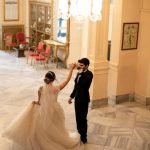Royal weddings have always been a moment of great significance and public interest, especially when it comes to the British Royal Family. They serve as a display of tradition and pageantry, while also holding political and historical importance. The marriage of Prince Charles to Camilla Parker Bowles was no exception, but it was marked by controversy and speculation. One of the most perplexing aspects of their wedding was the absence of Queen Elizabeth II.
Prince Charles and Camilla’s relationship had long been a subject of public scrutiny, stemming from their previous marriages and the affair that led to their union. Despite this, they eventually decided to tie the knot in 2005, with much anticipation about how the event would unfold. However, one unexpected twist was the Queen’s decision not to attend her son’s wedding to Camilla.
The absence of the Queen at such a significant family event sparked widespread speculation and rumors about the reasons behind her absence. Some wondered if it was a deliberate snub or if there were underlying tensions within the Royal Family. The public’s curiosity only grew as various theories emerged regarding the Queen’s surprising choice not to be present at her son’s wedding.
The History of the Royal Family
The relationship between Prince Charles and Camilla Parker Bowles has been a long-standing and controversial one, especially given their previous marriages. Both Charles and Camilla were married before they began their affair, which raised eyebrows within the Royal Family and the public.
Before marrying Camilla, Prince Charles was married to Princess Diana, while Camilla was married to Andrew Parker Bowles. The extramarital affair between Charles and Camilla during their respective marriages caused a great deal of scandal and controversy. This controversy made it difficult for the couple to be together publicly, leading to years of speculation about the nature of their relationship.
Despite their previous marriages and the public scrutiny, Prince Charles and Camilla eventually wed in 2005 in a civil ceremony at Windsor Guildhall. The couple’s marriage was met with mixed reactions from the public, given the circumstances that led up to their union. However, they have since solidified their position as members of the Royal Family and are often seen participating in royal events and engagements.
| Prince Charles | Camilla Parker Bowles |
|---|---|
| Married to Princess Diana | Married to Andrew Parker Bowles |
| Civil ceremony at Windsor Guildhall | Mixed reactions from the public |
The Controversy Surrounding Charles and Camilla’s Relationship
After the highly publicized divorce of Prince Charles and Princess Diana, the British public was captivated by Prince Charles’s subsequent relationship with Camilla Parker Bowles. Camilla had been a close friend of Charles before and during his marriage to Diana, which led to widespread speculation about their romantic involvement. This controversy surrounding their relationship overshadowed their individual divorces and subsequent union, leading to much debate and criticism.
The Legalities of Their Relationship
One of the key controversies surrounding Charles and Camilla’s relationship was the legality of their union. As future King, it was expected that Charles would have a “proper” royal marriage, which raised questions about whether he could marry someone who had been divorced. The Church of England at the time did not recognize remarriage after divorce if the former spouse was still alive. This added another layer of controversy to their relationship.
The Public Perception
The public’s perception of Camilla as a “third person” in Charles’ marriage to Diana further fueled the controversy. Many people viewed her as responsible for the breakdown of their marriage, leading to widespread negative attitudes towards her. This public sentiment created a challenging environment for Charles and Camilla as they navigated their relationship in the public eye.
Media Scrutiny
The intense media scrutiny surrounding Charles and Camilla’s relationship heightened the controversy even more. The tabloids were rife with stories about their affair, making it difficult for them to maintain any sense of privacy. The constant media attention only served to intensify public interest and fuel the already controversial nature of their relationship.
The controversy surrounding Charles and Camilla’s relationship set the stage for the events that unfolded leading up to their wedding, including speculation about why Queen Elizabeth II did not attend this historic event.
The Planning of the Wedding and the Guest List
When it came to planning the wedding of Prince Charles and Camilla Parker Bowles, there were several factors that needed to be taken into consideration. The couple wanted a low-key ceremony compared to the traditional royal weddings, which meant that the guest list had to be carefully curated. Only close family members and friends were invited to the civil ceremony, held at Windsor Guildhall.
In addition to the small guest list, there was also the issue of finding a suitable date for the wedding. The original date chosen was April 8th, 2005, but due to the funeral of Pope John Paul II, it was decided that the wedding should be postponed. This decision sparked some controversy and added to the already tense atmosphere surrounding Charles and Camilla’s relationship.
Despite both being divorced and their controversial past, Charles and Camilla’s decision to marry was not without criticism from various factions. There were those who supported their union but there were also others who disapproved given their history while they were both married. The controversy only heightened when it became known that Queen Elizabeth II would not attend her son’s wedding.
| Planning Considerations | Details |
|---|---|
| Guest List | Only close family members and friends were invited |
| Wedding Date | Originally set for April 8th, 2005; Postponed due to Pope John Paul II’s funeral |
| Controversy | The wedding sparked controversy given Charles and Camilla’s previous marriages |
The Queen’s Absence at the Wedding
One of the main reasons speculated for the Queen’s absence was due to the controversy surrounding Charles and Camilla’s relationship. Their affair during Charles’ marriage to Princess Diana had caused immense public scrutiny and backlash, leading to a strained relationship between the Royal Family and the public. Some believed that the Queen did not want to further stir up negative sentiment by attending their wedding, while others thought she simply did not approve of their union.
Another theory behind the Queen’s absence revolved around her duties as monarch. Being the head of state comes with an array of responsibilities, and some believed that her absence at the wedding was a calculated decision to maintain neutrality and distance herself from personal matters within the Royal Family. This fueled speculation about possible tensions or disagreements within the family that led to her choice.
Ultimately, despite various speculations and rumors, it was unclear why exactly Queen Elizabeth II did not attend Charles and Camilla’s wedding. Her official statement on her decision provided some insight but remained diplomatic, leaving room for continued theories about her reasoning for not being present at such a significant event in her son’s life.
The Queen’s Official Statement on Her Decision
When it was announced that Queen Elizabeth II would not be attending the wedding of her son, Prince Charles, to Camilla Parker Bowles, it sparked a flurry of speculation and rumors. Many were left wondering why the Queen would choose to miss such an important event within the Royal Family. In response to the public curiosity, Buckingham Palace released an official statement addressing the Queen’s absence from the wedding.
The Reasons Behind Her Decision
The official statement from Buckingham Palace cited the Queen’s desire to give the couple their own spotlight as the main reason for her absence. It emphasized that as Prince Charles’ second marriage, it was important for him and Camilla to have a day focused solely on their union without any distractions or overshadowing by other members of the Royal Family.
The statement also made it clear that while the Queen would not be in attendance at the ceremony, she would be present at the subsequent reception to show her support for her son.
Respect for Tradition and Protocol
In addition to ensuring that Charles and Camilla had their moment in the spotlight, it’s been speculated that the Queen’s decision may have been influenced by a sense of respect for tradition and protocol within the royal institution. Given the controversial nature of Charles and Camilla’s relationship in light of their previous marriages, some believe that the Queen’s absence was a way to maintain a sense of decorum and respectability within the Royal Family.
The Impact on Public Perception
While Buckingham Palace sought to provide clarity on the Queen’s decision not to attend Charles and Camilla’s wedding, speculation and theories continued to circulate regarding her true motivations. The public reaction varied, with some expressing disappointment at her absence while others understood and respected her decision. However, this created a lingering impact on how the event was perceived by both royal observers and members of the public alike.
Speculations and Theories Behind the Queen’s Absence
When it was announced that Queen Elizabeth II would not be attending the wedding of her son, Prince Charles, to Camilla Parker Bowles on April 9, 2005, speculation and rumors immediately began to swirl. The absence of the Queen at such a significant royal event raised questions and gave rise to various theories about why she chose not to attend.
Some speculated that the Queen’s absence was a strategic move to avoid being associated with the controversy surrounding Charles and Camilla’s relationship. Given the scandalous history of their romance and previous marriages, some believed that the Queen may have opted to distance herself from the situation in order to protect the reputation of the Royal Family.
Another theory behind the Queen’s absence was related to her role as Supreme Governor of the Church of England. It was suggested that her decision not to attend her son’s wedding may have been influenced by religious considerations, as Charles and Camilla’s relationship had caused a significant uproar within the Church due to their past divorces.
Despite these speculations and theories, there has never been an official explanation from Buckingham Palace regarding the reason for the Queen’s absence at Charles and Camilla’s wedding. The mystery surrounding her decision has only served to fuel ongoing curiosity and conversation about this historic event.
The Public Reaction to the Queen’s Absence
After the news broke that Queen Elizabeth II would not be attending the wedding of her son, Prince Charles, to Camilla Parker Bowles, the public’s reaction was a mix of surprise and speculation. As one of the most prominent figures in the Royal Family, the Queen’s absence at such a significant event raised questions and fueled rumors. Here is a closer look at how the public reacted to her decision.
1. Shock and disappointment: Many people were shocked to learn that the Queen would not be attending her son’s wedding. This led to widespread disappointment among those who were looking forward to seeing the entire Royal Family come together for this special occasion.
2. Speculation about family dynamics: The public couldn’t help but wonder why the Queen chose not to attend Charles and Camilla’s wedding. This led to various theories about potential conflicts or tensions within the family, adding an element of drama to an already controversial event.
3. Support for the Queen’s decision: On the other hand, there were also voices of support for the Queen’s decision. Some individuals argued that it was important for her to prioritize her duties as monarch, while others defended her right to make personal choices regarding family events.
Overall, the public reaction to the Queen’s absence from Charles and Camilla’s wedding was a mix of surprise, speculation, and support. It sparked conversations about family dynamics and priorities within the Royal Family, adding another layer of intrigue to an already controversial relationship and event.
Conclusion
The absence of the Queen at Prince Charles and Camilla’s wedding was a topic that grabbed the attention of the public and sparked numerous speculations and theories. The decision not to attend such a significant event in her son’s life undoubtedly had an impact on both the royal family and the public’s perception of their relationship.
Despite the controversy surrounding their relationship, the absence of the Queen at the wedding had lasting significance that continues to be discussed and analyzed.
The public reaction to the Queen’s absence was mixed, with some expressing disappointment or confusion while others defended her decision. Speculations and theories behind why she chose not to attend ranged from health concerns to personal disapproval of Charles and Camilla’s relationship. However, it is important to consider that as a constitutional monarch, the Queen is bound by certain protocols and expectations, which may have influenced her decision in ways that we may never fully understand.
The ongoing significance of this event lies not only in the speculation surrounding the Queen’s absence but also in how it reflects upon the ever-evolving dynamics within the royal family. This chapter in history serves as a reminder of the complexities within a centuries-old institution and its enduring influence on public opinion and perception.
As time passes, new insight or information may surface regarding why the queen did not attend Charles and Camilla’s wedding, but for now, it remains an intriguing part of royal history.
Frequently Asked Questions
Why Did the Queen Not Allow Charles to Marry Camilla?
The Queen did not allow Charles to marry Camilla because of the societal and religious restrictions at the time. The public also had a strong attachment to the idea of Charles marrying a virgin.
Did Camilla Wear White to Diana’s Wedding?
No, Camilla did not wear white to Diana’s wedding. She wore a pale blue outfit. There were rumors that she intentionally chose the color to send a message, but this has been denied by her representatives.
Why Did Camilla Marry Parker Bowles?
Camilla married Parker Bowles because they were in a relationship before Charles and Diana got married. Despite their love for each other, societal expectations and duty led them to marry other people before eventually reuniting later in life.

Welcome to my blog about home and family. This blog is a place where I will share my thoughts, ideas, and experiences related to these important topics. I am a stay-at-home mom with two young children. I hope you enjoy reading it! and may find some helpful tips and ideas that will make your home and family life even better!





